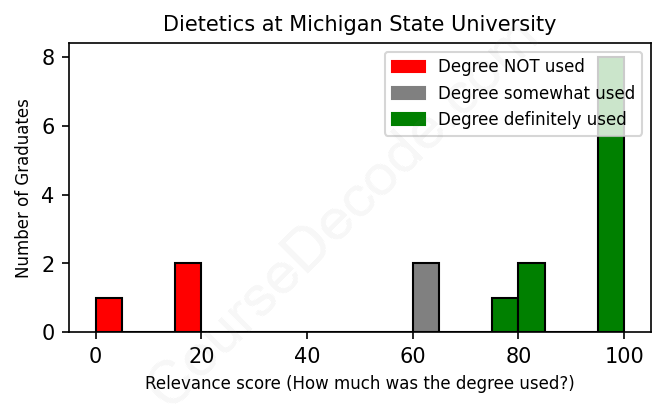
First, some facts. Of the Dietetics graduates from Michigan State University we've analyzed , here's how many have used (or NOT used) their degree in their career:

These are estimates based on AI analysis of 16 LinkedIn profiles (see below).
The verdict? Above average. Overall, with an average relevance score of 74%, Dietetics graduates from Michigan State University have a higher likelihood (+7%) of finding work in this field compared to the average graduate across all fields:
And for comparison, here's the chart for all profiles we've looked at across all degrees.
Also, after graduating, 56% of these graduates have pursued further education other than another Bachelor's degree (such as a Masters degree or other), compared to the average across all profiles of 35%. This suggests you may need more than just a Bachelors degree to be competitive as a Dietetics graduate.
See the details:
|
Relevance score: 97% We think this person has gone into a career highly relevant to their degree. We think this person has gone into a career highly relevant to their degree.
DEGREE INFOGraduated in 2011 from Michigan State University with a Bachelor of Science (B.S.) in Dietetics. Also pursued further education since (see below). JOB HISTORY SINCE GRADUATIONFood Service Director Ellensburg School District Jul 2012 - Jun 2014 Food Service Director  Bethlehem Central School District Aug 2014 - Aug 2022 Sales Director - Upstate NY  At Your Service Sales Aug 2022 - Mar 2023 Administrative Dietitian  Capitol Region BOCES Feb 2023 - Present FURTHER DEGREES DONE SINCE GRADUATINGInternshipBastyr University 2011 - 2012 ABOUTNo information provided. |
The top 10 most common jobs done by the graduates we've analyzed (ranked most common to least) are:
From analyzing the LinkedIn profiles of Michigan State University graduates with a degree in Dietetics, it seems that many of these individuals have gravitated toward positions that either directly apply or are somewhat related to their studies. A large number have taken on roles as clinical dietitians or registered dietitians, where they utilize their knowledge of nutrition to manage patient care, which is definitely in line with the core principles of their education. Positions like Clinical Dietitian, Pediatric Dietitian, and various intern roles highlight a strong focus on practical applications of dietetic skills, underscoring the relevance of their degree to actual job requirements.
On the flip side, there are also graduates who have landed jobs that seem less related to dietetics, such as those in management roles at restaurants or general teaching positions. It's clear that while some have found their niche in healthcare and nutrition-focused roles, others have ventured into different fields, which may not fully utilize their dietetics education. So, while a significant portion of these MSU graduates apply their degree directly in their careers, there's also a noticeable trend of graduates taking paths that diverge from the core tenets of dietetics, reflecting a mix of both relevant and unrelated career choices in their professional journeys.
Here is a visual representation of the most common words in job titles for Dietetics graduates (this is across all Dietetics graduates we've analyzed, not just those who went to Michigan State University):

The graduates from Michigan State University’s Dietetics program generally follow a career path that is quite relevant to their field of study. Right after graduation, a lot of these individuals kick off their careers as dietetic interns or clinical dietitians, which solidifies their expertise and helps them gain valuable hands-on experience. For instance, many started off with internships that rotated through various settings like hospitals, schools, and community health organizations. This foundational experience appears to set them up nicely for roles as Registered Dietitians or in food service management, showcasing a clear connection between their degree and their early career steps.
As time goes on, say five to ten years down the line, many graduates tend to climb the career ladder into more specialized roles or management positions within the dietetics field. We see some moving into roles like Nutrition Managers or Clinical Nutrition Directors. However, not everyone stays strictly within the dietetics realm; a few diverge into related areas like nutrition consulting or even leadership roles in health and wellness organizations. Overall, while there are a couple of examples of individuals veering off into unrelated paths, the majority of these MSU grads are making a solid impact within nutrition and dietetics, indicating that pursuing a degree in this field can indeed lead to fulfilling and relevant careers. It's pretty reassuring for anyone considering this path!
Honestly, a Bachelor’s degree in Dietetics can be pretty challenging, especially at a place like Michigan State University, which has a strong program. You’ll dive into a mix of science-heavy courses like nutrition, biology, and chemistry, along with hands-on experiences that require you to apply what you learn. It’s definitely not a walk in the park; there's a good amount of coursework and some intense studying involved. However, if you’re really into health, food, and helping others, it can be really rewarding too, and some students find it easier than other science-focused majors. Just be prepared to put in the effort!
Most commonly, in the LinkedIn profiles we've looked at, it takes people 4 years to finish a Bachelor degree in Dietetics.
Looking at the job paths of these Dietetics graduates from Michigan State University, it seems like some of them are doing pretty well, while others are kind of just getting by. For instance, those in management roles or with experience in clinical nutrition—like the General Manager at Buffalo Wild Wings or the Clinical Nutrition Manager—probably have decent salaries, especially given the experience they’ve accumulated. On the flip side, many of the positions like teaching or entry-level dietitian roles tend to pay less, which might make it tough to really bank much. So, overall, it's kind of a mixed bag; some are likely making good money, but others? Not so much.
Here is a visual representation of the most common words seen in the "about" section of LinkedIn profiles who have a Bachelor degree in Dietetics (this is across all Dietetics graduates we've analyzed, not just those who went to Michigan State University). This may or may not be useful:

Here are all colleges offering a Bachelor degree in Dietetics (ordered by the average relevance score of their Dietetics graduates, best to worst) where we have analyzed at least 10 of their graduates:
| College | Score | Count |
|---|---|---|
 University of Delaware University of Delaware
|
87 | 13 |
 Purdue University Purdue University
|
79 | 10 |
 University of Kentucky University of Kentucky
|
76 | 10 |
 Michigan State University Michigan State University
|
74 | 16 |
 Brigham Young University Brigham Young University
|
73 | 12 |
 Iowa State University Iowa State University
|
72 | 13 |
 Florida State University Florida State University
|
67 | 11 |
 Arizona State University Arizona State University
|
65 | 12 |